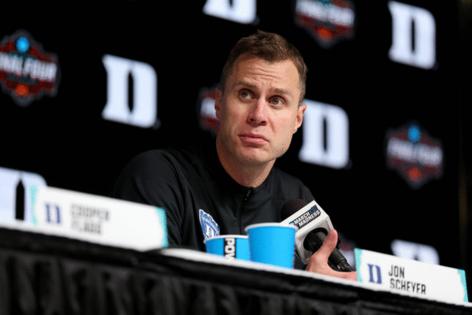Luke DeCock: Duke coach Jon Scheyer wasted no time looking for lessons in Final Four collapse
Published in Basketball
DURHAM, N.C. — Jon Scheyer waited less than 24 hours to relive the worst 74-second sequence of his coaching career. On the flight home from San Antonio, the Duke coach opened up his laptop to rewatch the video of his team’s shocking collapse the evening before against Houston.
“I wasn’t going to be able to sleep, anyway,” Scheyer said Tuesday.
For all the good of last season — a trip to the Final Four, a double ACC championship, five first-round draft picks, including three in the top 10 — it will forever be colored by the way it ended, with Duke leading Houston by six with a minute and change left only to lose by three, superstar freshman Cooper Flagg’s last shot coming up short.
The in-flight horror movie was the first of many viewings. Scheyer said Tuesday he did not shy away from digging into what went wrong, wasting no time getting into the autopsy of a stunning loss. That’s been true over the intervening three months as well, because as much as he tried to pivot to the new season — and it was essential to work quickly to secure potential departees like Maliq Brown, Isaiah Evans and Caleb Foster — there were still lessons to be learned.
“You’re not afforded time to really feel,” Scheyer said. “I was having meetings Monday morning with our players on coming back. You have to make sure you do your job to have the best team possible for the following season. At the same time, I think it’s natural to shy away from it and make an excuse and rationalize. For me, I only know one way, and that’s to dive deeper into it.
“I watched the game countless times. I’ve tried to reimagine and replay — it’s not about second-guessing or anything like that, but it’s the reality that basketball is an amazing sport where crazy things can happen. You see it in the NBA playoffs. You don’t get that moment back, but at the same time, where you draw from it and you lean into it, it’s the only way forward.”
Much as Scheyer had a year earlier after Duke’s regional-final loss to N.C. State, the lessons of a difficult end to the season were quickly digested. The Blue Devils’ journey to the Final Four started in a different Texas city, in Dallas in the wake of a second upset by the Wolfpack in three weeks, when Scheyer and veteran guard Tyrese Proctor both resolved to chart a new course.
Scheyer started the next day, and the consequences were swift. Several players exited quickly. Veteran transfers like Sion James and Maliq Brown were added to play alongside talented freshman class with Flagg and Kon Knueppel and Khaman Maluach. Length and versatility were prioritized to give Duke more options on defense.
All of that played out as more or less as planned, through the regular season and ACC tournament and NCAA tournament, right up until the penultimate minute of what was supposed to be the penultimate game of the season.
“It’s heartbreaking the way it ends,” Scheyer said. “Especially knowing we had a group that was really special, incredibly bought-in, really talented, just a great group. So for me, it’s more about what you’re trying to replicate. Obviously, I’m poking holes in everything we’ve done. I’m good at that. I’m good at poking holes and expanding the margins. That’s something we always look to do.”
Some of what worked last year hasn’t changed: This year’s freshman class is different, built around the Boozer twins, without an out-and-out superstar like Flagg, but still extraordinarily talented. Brown and Evans and Foster were all coaxed into returning, along with Patrick Ngongba. Even without Cedric Coward, who was recruited in the transfer portal to play the veteran utility role James played a year ago, only to end up a first-round pick himself, it’s once again a long and versatile group.
But this team will have at least one thing its predecessor did not: The benefit of the difficult lessons its coach gleaned from a devastating loss, one he faced head-on in the immediate aftermath.
“I had to see it,” Scheyer said. “There’s lessons from that game that I’ll share with our team at the right time. For me, it took a couple months to really just understand, process, feel it, live it, and feel the pain. Feel everything that’s associated with it. In order to be the best for our team and be the best coach, I think you’ve got to feel those things.”
____
©2025 The News & Observer. Visit at newsobserver.com. Distributed at Tribune Content Agency, LLC.







Comments